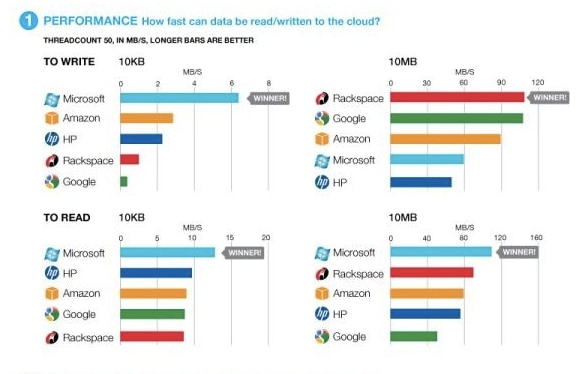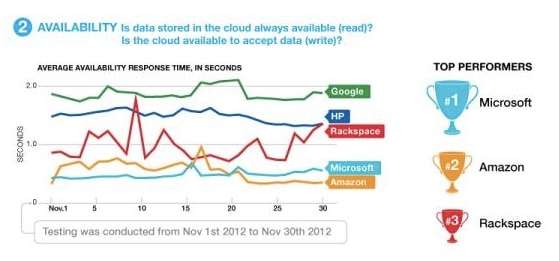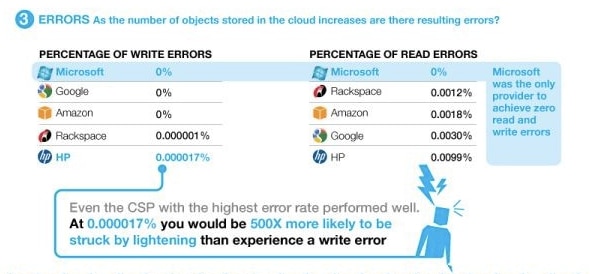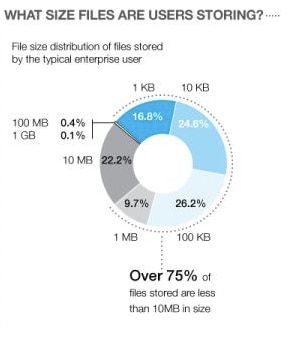Global Cloud Storage Volume in Numbers
According to recent research by Nasuni, there is over 1 Exabyte of data stored in the cloud, or:
- 1024 Petabytes of data
- 1,073,741,824 Gigabytes of data
- quintillion bytes of data
- over 67 million iPhones worth of data
- 50,000 trees made into paper and printed
- a lot
Does the Cloud Have Enough Storage Space?
An outdated expression is that all words ever spoken by human beings could be stored in approximately 5 exabytes of data. Also, on Star Trek, the lieutenant commander Data was said to have a storage capacity of 0.1 exabytes. However, we are now creating data faster than we can store it. To quote Eric Schmidt: “There was 5 Exabytes of information created between the dawn of civilization through 2003, but that much information is now created every 2 days, and the pace is increasing.” And not only within private infrastructures, but more than half of data created by organizations, by 2016, as predicted by Gartner, will be stored in the public cloud.
Book a demo today to see GlobalDots is action.
Optimize cloud costs, control spend, and automate for deeper insights and efficiency.


To understand the cloud storage meaning, please visit How Cloud Works and Types of Cloud posts.
Who are the Top Providers of Cloud Storage?
The Nasuni group measured performance, availability and scalability, among five different cloud services and found Microsoft and Amazon to be the top providers of cloud storage. Among other evaluated were Google, Hewlett-Packard, and Rackspace storage. Nasuni lists three major benchmarks for the cloud storage providers (CSPs) against which the services were tested, as follows:
- performance, or how fast can data be read/written to the cloud
- availability, or is the data stored in the cloud always available
- errors, or are there resulting errors as the number of objects stored in the cloud increases
Find out below how the current CSPs performed in the benchmark tests performed by the Nasuni group.



The Nasuni group also checked what file sizes most CSP are using and found that over 75% of files are stored in less than 10 megabytes in size (see below).

In the beginning of the year, Gartner made a survey with different organizations and found out that 19% of organizations are using the cloud for production computing, while 20% are using public cloud storage services. The percentage is to climb up to 50% by the year 2016, according to Gartner.
Gartner also listed top 10 cloud storage providers, based on enterprise capabilities, as follows:
- Amazon
- AWS
- AT&T
- HP
- IBM
- Internap
- Microsoft
- Nirvanix
- Rackspace
- Softlayer
It is only logical to expect that with the predicted increase in cloud storage, the number of vendors deciding for the cloud storage service will escalate in the following years.

And what about the data traffic in the cloud?
According to Cisco’s global cloud index, by 2016, nearly two-thirds of all workloads will be processed in the cloud. This includes data centers whose global IP traffic will reach 554 exabytes per month by 2016, which puts them firmly in a zettabyte era (1 zettabyte is 1,000 exabytes). Global cloud IP traffic is, subsequently, expected to increase six-fold between 2011 and 2016. “An important traffic promoter in the rapid expansion of cloud computing is increasing data center virtualization, which provides services that are flexible, fast to deploy, and efficient,” the report concludes.
It’s fairly inconceivable how cloud storage providers will need to perform by then on the performance, availability and scalability tests.






